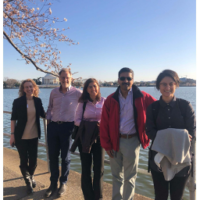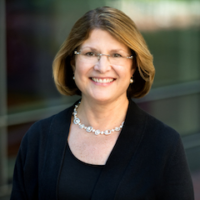Expanding the Pipeline: The SIGCSE 2022 Technical Symposium
 The SIGCSE 2022 Technical Symposium was a hybrid event with both virtual and in-person participation in Providence, Rhode Island March 2-5. Across the three conference tracks of Computing Education Research, Experience Reports and Tools, and Position and Curricula Initiatives, there were 144 accepted papers. Additionally, there were 15 panels, 9 special sessions, 24 workshops, 15 papers as part of the ACM Student Research Competition, 34 birds of a feather sessions, 15 demos, 17 lightning talks, 6 nifty assignments, 99 posters, and 29 exhibitors. The Pathable platform was used to provide virtual participants access to the conference sessions.
The SIGCSE 2022 Technical Symposium was a hybrid event with both virtual and in-person participation in Providence, Rhode Island March 2-5. Across the three conference tracks of Computing Education Research, Experience Reports and Tools, and Position and Curricula Initiatives, there were 144 accepted papers. Additionally, there were 15 panels, 9 special sessions, 24 workshops, 15 papers as part of the ACM Student Research Competition, 34 birds of a feather sessions, 15 demos, 17 lightning talks, 6 nifty assignments, 99 posters, and 29 exhibitors. The Pathable platform was used to provide virtual participants access to the conference sessions.
Thursday Plenary: Reflections on Programming Methodology
The plenary session on Thursday was kicked off by ACM Turing Award and Von Neumann Award winner Barbara Liskov (MIT) on “Reflections on Programming Methodology”, where she shared her career and a brief history of the field of computing. Barbara got into computing by accident because she could not get a job as a mathematician. While there was no training in CS as there were no CS degrees offered, companies were hiring programmers. She described the software crisis in 1970 – millions of dollars were poured into software development and these efforts failed because people did not understand how to build programs that worked. This led to an examination of programming methodology – how should programs be designed, and how should programs be structured? She listed several foundational papers, and with Stephen Ziles introduced the notion of abstract data types in order to further work at the highest level to increase programmer productivity, and to enable generic operations such as iteration and sorting to avoid duplicating code to handle each individual data type. These were implemented in the programming language she created at MIT called CLU, an object-oriented programming language that offered clusters for coherent and systematic handling of abstract data types, iterators, exception handling, and polymorphism via generics. When Barbara finished CLU, she was interested in creating a commercial programming language, but these were only done in industry, so she focused on distributed computing, and then moved onto programming methodology with John Guttag. Then came inheritance, classes and subclasses, type hierarchies, and behavioral subtyping, the latter resulting in what came to be known as the Liskov Substitution Principle. A person once wrote a comment wondering why she won the Turing Award for her work on abstract data types, since “everybody knows this anyway”. Barbara was pleased to remark that her work and the work of others mentioned in her talk had “coalesced in an understanding of how to build code, and it had become so ingrained in our community that people didn’t even understand that there had been a time before when people didn’t know how to do this.”
When asked about which programming language should be taught as the first programming language and a follow-on question about how hard problems are hard in any language, Barbara felt that the language itself is only a tool – at how to teach programming is more important than the language you teach it with. In terms of how principles of computing should be taught, she thought that it should be computational thinking, which is broader than CS – which is a powerful technique for solving problems. Barbara also believed that team projects were great to provide opportunities to work together and provide some idea of problems they would be working on in the real world, but team dynamics is a challenge and students need support to working together effectively.
First Timer’s Luncheon: SIGCSE Overview
The First Timer’s Luncheon keynote speakers Sarah Heckman and Mark Sherriff gave an overview on SIGCSE the organization (not the conference)- its mission, membership, and activities. They informed participants about the CS-Ed podcast hosted by Kristin Stephens-Martinez at Duke University, described the three tracks of papers at the Technical Symposium in greater detail, and the different types of scholarship that each of these areas highlighted. The speakers also shared an update to the work that began as a project in 2014 to report on the state of empiricism in computing education, where the goal was to create a rubric that characterized the reporting of education research papers and to identify whether publications included the content necessary for researchers to perform replications, meta-analyses, and theory building. The effort was quite comprehensive, and evaluated all published papers from five venues, SIGCSE TS, ITiCSE, ICER, TOCE, and CSE, in 2014 and 2015; they are currently working through all the papers from 2019 and 2020. The good news is that most papers had some sort of evaluation by observation that would lead to further replication or theory building, and while most of the research is focused on pedagogical techniques, there was representation in all categories evaluated. The area least discussed were threats to validity or limitations of the research, which is important so others attempting to replicate the results were able to understand how far to take the results and how to translate into their own contexts. They shared great advice on how to get started, how to identify good research questions, the time required to revise and refine them, how to replicate studies, and how to get more involved in the technical symposium. The speakers also announced the winner of the SIGCSE Lifetime Service Award as Simon (University of Newcastle, Australia), who will receive the award at ITiCSE.
Friday Plenary: Awards and “Improving Diversity in Computing through Increased Access and Success” Keynote
Friday’s plenary session opened with the annual awards and included the award winners from 2021. The SIGCSE 2021 Test of Time Award was given to “The Incredible Shrinking Pipeline” published in CACM 1997 and authored by Tracy Camp (Colorado School of Mines), which is still the most cited paper on gender issues in undergraduate computing. The 2021 SIGCSE Award for Lifetime Service to the Computer Science Education Community was presented to Stephen Edwards (Virginia Tech) “for innovating automated feedback systems with WebCat, transforming software testing within computer science curricula, and exemplifying leadership in the computer science education research community.” The SIGCSE 2022 Test of Time Award was given to “Connecting K-16 Curriculum & Policy: Making Computer Science Engaging, Accessible, and Hospitable for Underrepresented Students” authored by Joanna Goode (University of Oregon) and published in the SIGCSE Technical Symposium 2010.
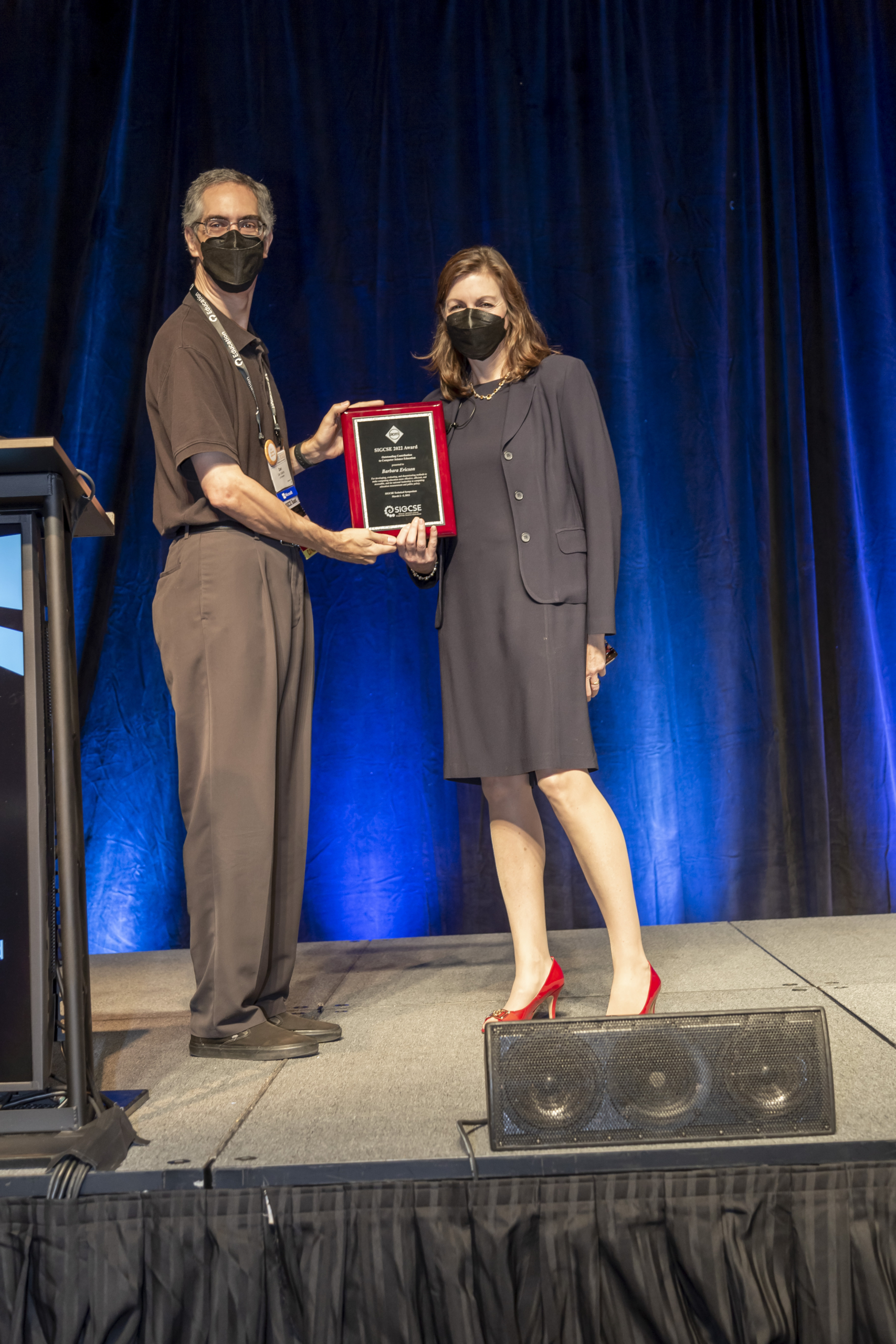
Dan Garcia presents award to Barbara Ericson.
Barbara Ericson received the SIGCSE 2022 Outstanding Contribution to Computer Science Education “For developing, evaluating, and disseminating methods to make computing education more effective, efficient, and accessible, and for national leadership in computing education measurement and public policy”. Her keynote “Improving Diversity in Computing through Increased Access and Success” highlighted her career, from her love of horses, debate, and early exposure to programming in high school, to her first jobs in industry research, and her role as an instructor and senior research scientist at Georgia Tech that led her to pursue a PhD in Human-Centered Computing. Barbara shared why diversity, access, and success mattered – from that early high school computer science course, she had access and encouragement, which led to her passion for teacher professional development, the creation of sustainably funded summer camps and weekend workshops, then into curriculum development and programming competitions with Georgia Computes! Through seed funding and training from the NSF BPC alliance they reached 500+ teachers, 1000+ students, and offered 39 weeks of summer camps in 2011 alone. Barbara found that for teacher professional development to be successful, it is important to build community and develop teacher leaders, involve active learning for both teachers and students, and the development of eBooks can make the programs affordable. Barbara began to focus on AP CSA pass rates in Georgia and the challenges became clearer when the data was broken down by race and gender. This led to the creation of Rise Up 4CS, Sisters Rise Up, and Project Rise Up 4CS to serve all underrepresented groups through near peer role models and mentors, remote and in-person help sessions, and interactive eBooks. When she published the AP spreadsheet in 2013, she noted that there were no female students who took the CS AP placement test in Mississippi, Montana, and Wyoming. Barbara partnered with Rick Adrion and Renee Fall to create Expanding Computing Education Pathways, where they took her eBooks, updated and improved them, and delivered them to Massachusetts students and educators. They shared their work in the 2021 State of Computer Science Education: Accelerating Action Through Advocacy report, noting the tension between serving more students and serving more diverse students and their decision to keep the spotlight on diversity. She found that representation of underrepresented students was not just a problem in CS, but in other areas, and likely a systemic racism issue in the way that schools are funded. Her future plans are to continue to increase access with the creation of more online courses and free and interactive eBooks, and to increase success through increased active learning, mentoring via Sisters Rise Up, and to more readily identify struggling students via careful data harvesting to provide personalized assistance interactively. Responding to a question on the exclusion of non-binary and trans learners, and how to include them in K-12 pathways, she suggested that AP self-reporting should be changed and should happen at the end of the test to avoid invoking stereotype threat.
Saturday Plenary: Diversifying Computing: Real Change Must Come from Within
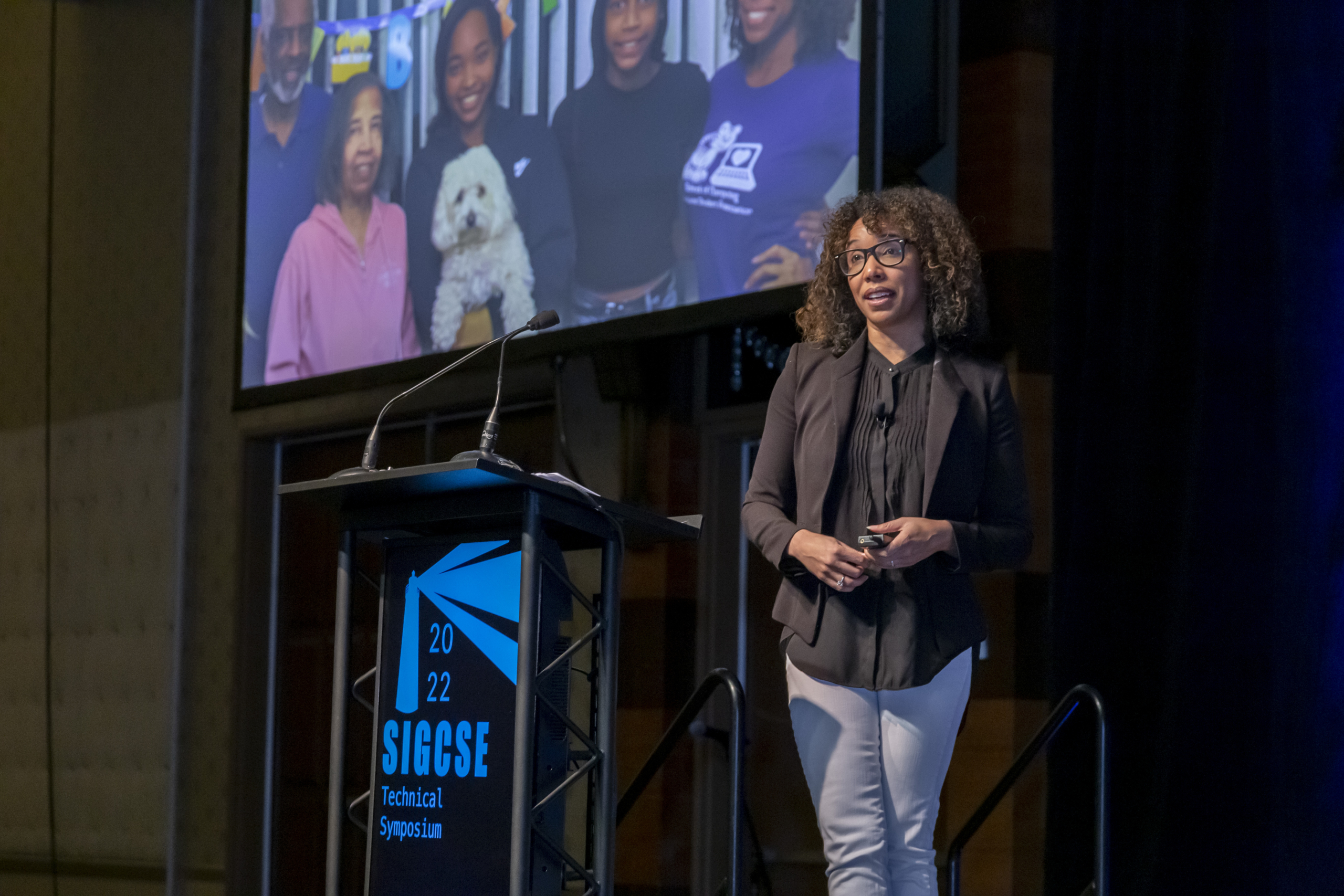
Shaundra Daily
The keynote by Shaundra Daily (Duke University), “Diversifying Computing: Real Change Must Come from Within” began with her personal story about four generations of women: Her great-grandmother, grandmother, mother, and herself. She laid out a timeline, beginning with the 13th Amendment, which forbids involuntary servitude or slavery, through the Jim Crow Era that ended in 1954 with the Brown vs. Board of Education decision that desegregated schools, to the Civil Rights Movement and the Space Race. Juxtaposed below was a timeline of her family, from her great-grandmother’s life as a sharecropper, her grandmother as a maid, and the limited educational opportunities her mother had in the 1950’s as a secretary with a degree in Office Administration. Shaundra noted that the Space Race was coincident with the development of the field of computing, computing culture and computing education, a place where there were few Black engineers and scientists. Active in gymnastics and dance, she had the benefit of a Catholic education because her public high school was an F-zone school.
While not a first-generation college student, Shaundra was first in her family to explore STEM. She was stepping into an institution where the people, policies, and practices were not designed for her with no programming or computing experience, but was expected to know certain things. She hid her life outside of school out of fear of misperceptions of her intelligence. Shaundra recognized the weed-out and competitive culture, the disconnect between her desire to teach kids about computers and her engagement with her community as a part of herself she could not bring into the classroom, and the limited views on acceptable research. She remembered that a professor told her that if you get a PhD, then nobody can tell you what to do, so she went for it not really knowing what that meant.
Shaundra wanted to apply her engineering skills to education, so she left her PhD program with a Masters and went to MIT. While there, she developed many coping strategies to deal with the culture.
Shaundra shared a list of obstacles for students, faculty, and people entering the tech industry that contribute to the often-hostile culture that people in marginalized groups encounter. She described her work with the Alliance for Identity Inclusive Computing Education, whose vision is to increase the entry, retention, and course/degree completion rates of students from groups that are historically underrepresented in computing, and closed with this call to action:
“All of these thoughts make it clear that in addition to the narrow path to computing, there is a fundamental misunderstanding of our identities and also our humanity. And we all have to take responsibility for examining the gaps and the weaknesses in our own understanding of identity. This is a process of not only learning but also unlearning, and we all have to make room for people to make mistakes and recover from them. And I hope we can use the lessons learned to change our policies, to change our practices, and to change ourselves so we are no longer negatively impacting people that are in our classrooms, that are in our departments, that are in our schools, that are in our institutions and are in our world, broadly. If you don’t know where to start, listen to Black women, listen to Indigenous women, listen to Latina women, listen to Asian women, listen to queer researchers, listen to trans researchers, listen to disability researchers, listen to the people who have these lived these experiences and are telling us that it’s not okay. Listen up. We’re telling you what’s wrong, so hear us. And don’t just stop at hearing us, use your privilege, use your power, use your influence to make sure that the computing community of 2023, of 2027, of 2035, when my children and my friends’ children are entering your institutions, are not met with the same obstacles, and harm, and difficulties, that we’re meeting with today.”
About the author:
Dr. Patty Lopez is currently an Intel Encore Computer Science Fellow at New Mexico State University (NMSU), a Hispanic Serving Institution where she is a distinguished alumna. Prior to her role at NMSU, she spent 13 years as a Platform Application Engineer at Intel and 19 years as an imaging scientist and software developer at Hewlett-Packard. Patty has seven patents and over 20 years of experience in diversity and inclusion work. She is a member of the CRA-WP Board, the Computing Alliance for Minority Participation Board, and the National Academy of Sciences, Engineering, and Medicine’s Roundtable on Systemic Change in Undergraduate STEM Education.
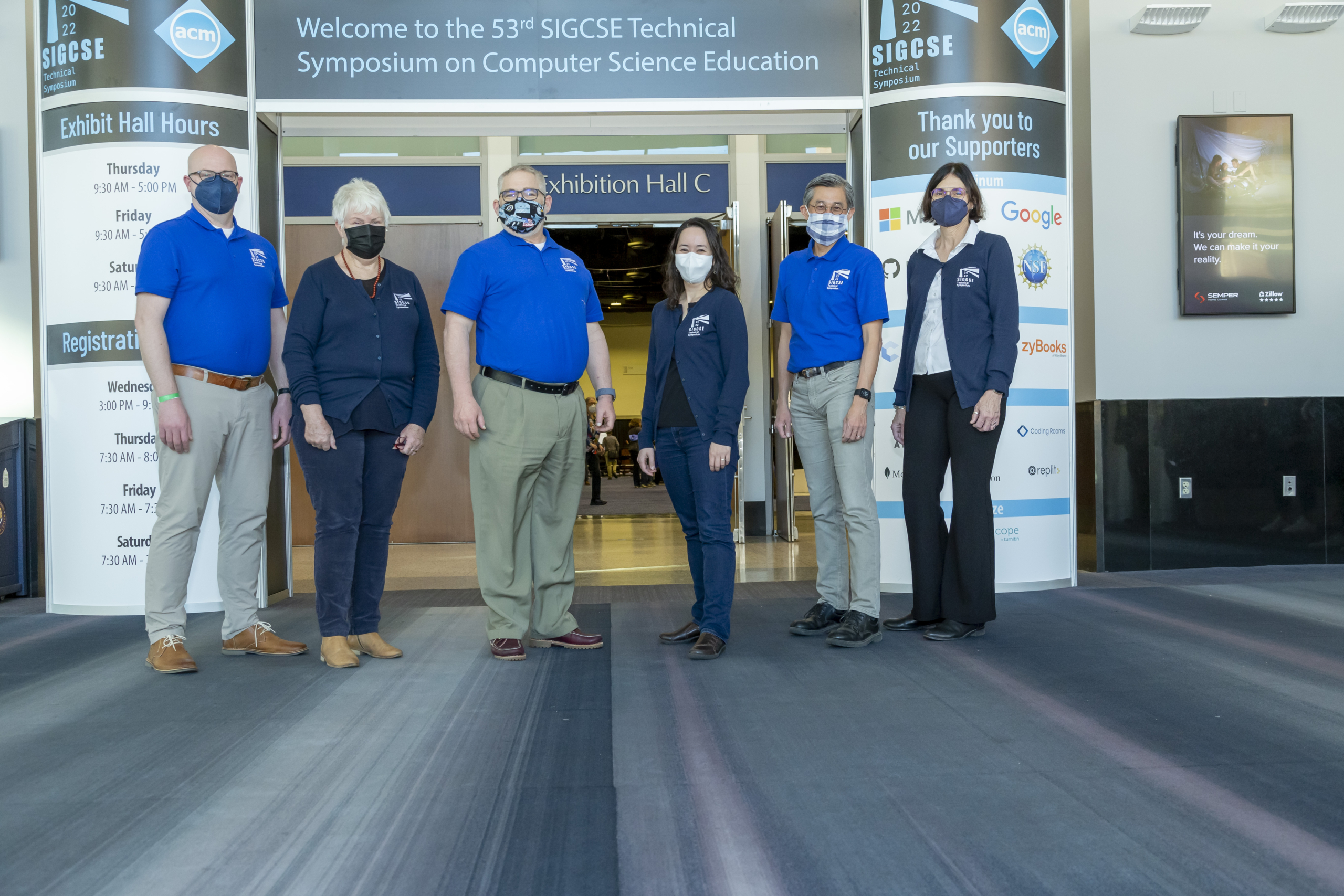
Symposium Committee for SIGCSE TS 2022. Left to right: Brian Dorn, Judy Sheard, Larry Merkle, Kristin Stephens-Martinez, Leen-Kiat Soh, and Maureen Doyle.
All photos courtesy of coleImage.com Cole Rodger Photographic








